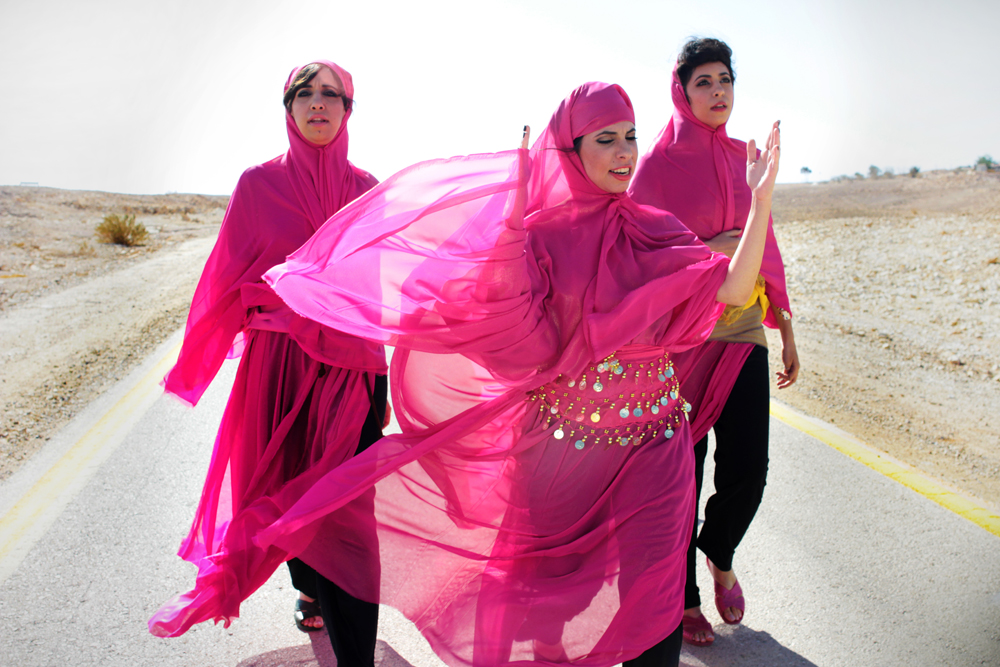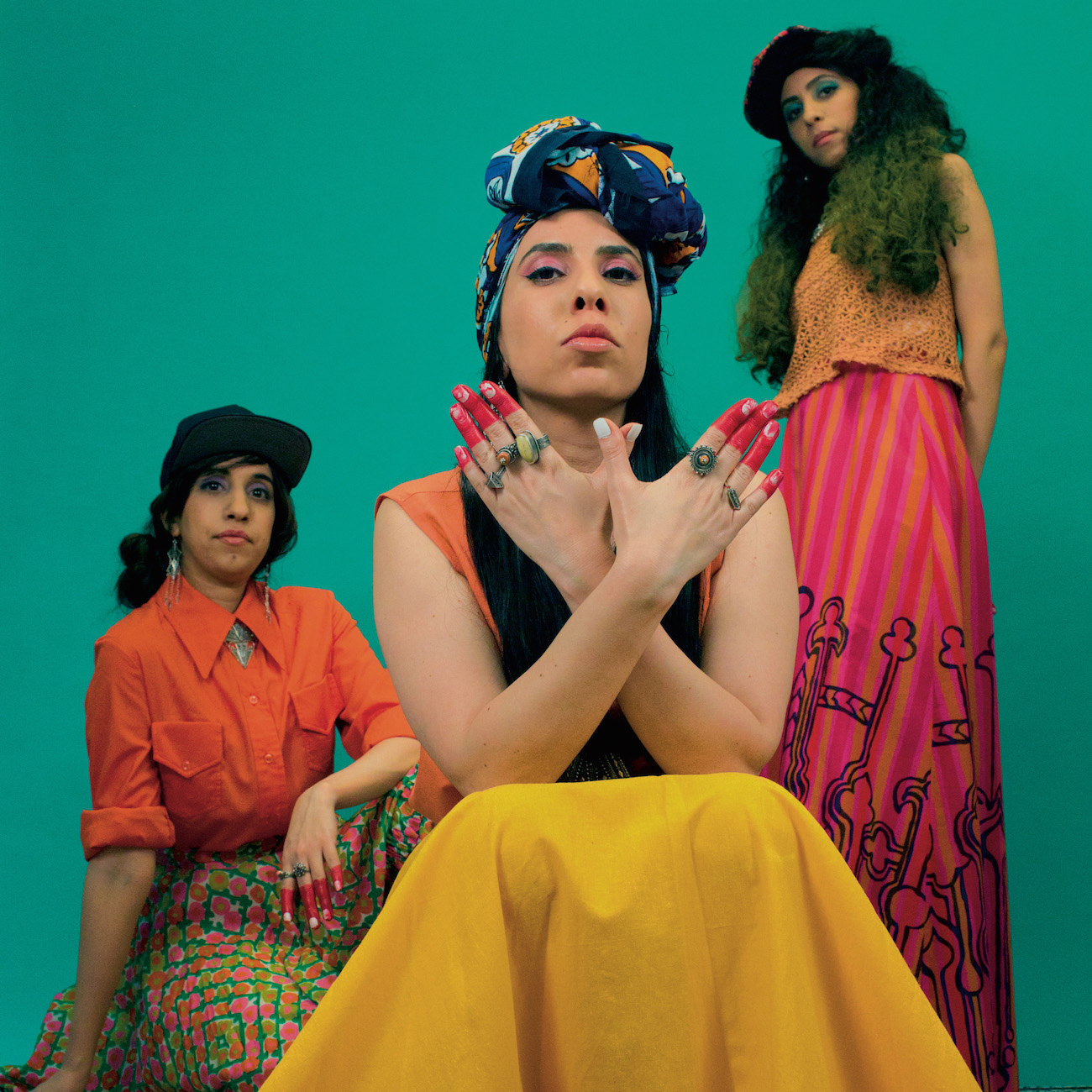Ain’t talkin’ ’bout no One Yemen Road
Co-authored by Franz Afraim Katzir
In the middle of A-WA’s US and European summer 2017 tour, Franz Afraim Katzir of Sephardic Heritage in D.C. (SHIN-DC) and I were given the opportunity to sit down and catch up with the firestorm of fierce girl power that are the Haim sisters: Tair, Liron, and Tagel. The group has gained popularity for its modern, yet traditional songs based on Yemenite Jewish folk music, and sung in the Yemenite Jewish variety of Arabic. Rolling Stone included A-WA on its ‘Ten New Artists You Need to Know’ list in June 2016, and their debut single, Habib Galbi (Dear of My Heart), has garnered nearly eight million views on YouTube.
Katzir learned a lot about the sisters during their 2016 visit to D.C., when he first met them and the Jewish-Iranian hip-hop artist Mana Eini over a dinner in celebration of Habib Galbi‘s release. The sisters grew up in a family of six siblings in a small village in Israel, which at the time was home to around thirty families. ‘One of our messages is that we are many things’, Liron said. ‘We are Israeli. We have Yemenite origins. We are Jewish. We are sisters. We are musicians.’ Adding to this, Tair said that they saw their music as playing a role in bringing people together. ‘[It’s] about spreading love and good music, to make people feel good about themselves, to celebrate life, and understand that we can have a conversation. It’s our gift; we’re not politicians.’ They share this gift with diverse audiences on social media and at concerts, including Palestinians, as well as many in the Arab diaspora in Europe. They have fans throughout the MENA region, in Egypt, Morocco, and especially the UAE, where taxi drivers apparently have a thing for their music. At concerts, Yemenis of all backgrounds tell them their music reminds them of home.

Photo by Hassan Hajjaj
While their father’s family comes from Yemen, and their mother’s from Morocco and Ukraine, the sisters feel very connected to their Yemenite origins. As little girls, they would visit their paternal grandparents, who immigrated to Israel during Operation Magic Carpet nearly seventy years ago. On holidays and during family celebrations, they found themselves inspired by their grandmother, who would sing Yemenite folk songs, and their father, who would pray in Yemenite Hebrew. As their father bought them many instruments and owned many records, there was always music at home. Through their father’s collection, they were exposed to genres like rock and roll and Motown, and today, also count Ladino, sixties and seventies progressive rock and psychedelia, jazz, blues, and American musicals – not to mention Yemenite folk music – amongst their influences.
The sisters have a particular fondness for what they call the ‘old tribe’ – i.e. singers who emigrated from Yemen to Israel, and who recorded folk songs during the fifties and sixties. They learned from pioneers such as Aharon Amram, who preserved many old folk songs in addition to writing new ones in Israel, as well as the ‘old ladies’ of the tribe. ‘They have the best music – tehinas – which are so tribal and soulful’, said Liron, before noting that it was women who were responsible for much of what survives of Yemenite-Jewish folklore. ‘They couldn’t read or write, or participate in synagogue services and ceremonies’, she said. ‘They were at home taking care of the kids and doing chores, but also singing to other women and telling them stories … These simple, honest, and direct songs were they only way they could express their emotions.’
The sisters have been playing music and performing together as well as separately from a very young age. Around six years ago, after Tair and Liron finished university, but before Tagel started, they linked up at home and decided to create A-WA. They sat down and started playing music again, writing, singing, and uploading to YouTube simple videos of Yemenite songs with hip-hop beats created on keyboards. Encouraged by positive comments, they decided to ‘go with their guts and do what they [loved]’, and began seeking the right producer to take their music to the next level.
Although they sometimes get into arguments, they have learned to ‘accept the differences’. The love and feeling of family is very important to them, and they don’t take their shared journey for granted. Having grown up in a tiny village without many other kids around, they regard one another as the best of friends. ‘You’re forced to be’, Tair said. ‘It’s the desert, and you go out and you only see mountains.’ This environment not only shaped the close friendships between the sisters, but also helped them develop their imaginations, as they had to create ‘everything from nothing’.
To get a sense of their personalities and what each brought to the group, we asked the sisters about their individual backgrounds. Tagel is a graphic designer and illustrator, bringing all the visuals to the group, such as collages, posters, and album covers. Liron studied architecture and interior design, and is very much involved in the creative process, as is Tair, who has a bachelor’s degree in music. ‘Tair is the leader’, Tagel said. ‘I say to her, “Moses, lead us to the Promised Land”, Liron added. Liron, on the other hand, provides the group’s ‘good vibes’, acting as the glue holding everything together.
Tradition is something that always develops. We don’t believe in just keeping it the way it is, and to never touch it. The whole experience is to take it and to make it your own.
When the sisters left Washington in 2016, they promised to come back and visit us. They also told us about the things we had to look forward to: more collaborations with artists, musicians, designers, and photographers, and more performances around the world at some of the biggest festivals and most happening clubs. They did return in 2017, dressed in Moroccan snake-pattern slippers and colourful modern thobes, to catch up with us, as well as give us an update on what was happening in their world.
Afraim: Your hafla (‘party’) was bumpin’ last night. I was dancing next to the cheerleader. Liron and I somehow managed a high-five through the pompoms. It’s been a year since you were in D.C. for your release party. The dinner we shared was so special for us. So, now that you’re back after a year, what do you feel are some of the highlights since the last time you were in the States? I really enjoyed learning about your trip to Réunion Island.
Liron: We had an awesome Indian Ocean adventure [there]. We really enjoyed meeting the people on that beautiful island, and the food was great.
Tair: I loved it last night actually in D.C. Coming back to the States and seeing this love from the audience – it’s not something to be taken for granted. A great start for our tour.
Afraim: What are some collaborations you’re excited about?
Tair: The Pitbull remix. It’s huge, really.
Tagel: Also the new song we did with Acid Arab. We made a full track with them.
Liron: Yeah, we added it to the show
Tagel: Also the photo shoot with Hassan Hajjaj. That was a dream come true.

Photo by Hassan Hajjaj
Afraim: So what’s next for A-WA?
Tair: Now that we’re working on our second album, our focus, all of the energy, is going in this direction. We’re really excited to share some new stuff with everybody!
Afraim: When is it coming out? What can you tell us about it?
Tair: Hopefully in summer 2018. We’re working really hard to make it happen.
Liron: While we’re touring, the schedule is very tight, but we’re very excited to release it.
Tagel: Hopefully we’ll release a single next month.
Tair: And a new video. The next album is going to be an all-original creation. We’ll write the lyrics and compose everything, so it’s [a progression] from our debut album.
Tagel: Yeah. That was more based on folklore.
Tair: It’s going to be a concept album. It’ll be very interesting, inspired by our true family story from Yemen to Israel, this journey of our grandmother. We can’t say much, because it’s really in process, you know?
Afraim: You have me on edge!
Tair: This is going to be amazing, and the production is going to be –
Tagel: – On the next level. In terms of visuals, too.
Tair: We’re [also] working on a new website, which will be more artistic and include stories from the road.
Tagel: We’re working on more artwork.
Tair: [And] some new collaborations with designers. We have a very cool [project] that [will soon be featured] in Con Art.
Valeriya: So is the new album going to be in Hebrew or Arabic?
Tagel: It will be in the Yemeni dialect.
Tair: Yeah, the Jewish-Yemeni dialect of Arabic.
Tagel: Maybe in the future we’ll release something in English.
Tair: We’re always thinking about that. Hebrew, too.
Valeriya: So, to follow up on that, can you tell us more about how you connect to your Yemeni culture? How authentic do you feel you have to be, and when do you feel like you can take creative liberties to make things uniquely A-WA? How do you balance the folk elements and your originality?
Tagel: [The folk music] has been such a huge part of us since we were little girls, so it’s not something we think about. It’s a part of us.
Tair: It comes naturally, and we have no limits. I mean, we don’t think, Oh, people are going to say this or that. We just go with what feels right to us, and we say that this is the most authentic. When you come from this place, the crowd feels it.
Liron: Tradition is something that always develops. We don’t believe in just keeping it the way it is, and to never touch it. The whole experience is to take it and to make it your own.
Tagel: To always make it relevant.
Liron: Exactly – to bring it to our times. We kind of have fun with it, because we know we are coming from a very authentic place. We do it freely.
Afraim: It’s known that each synagogue in Yemen had a rabbi and poet. This just goes to show that they were keeping the artistic traditions alive, and that they weren’t stagnant; it was a dynamic process. What you’re doing seems to be in that same tradition of keeping things dynamic.
Tair, Liron, Tagel: Thank you!
Afraim: Now, we have a question from Josh N., the winner of the concert ticket giveaway we did for the D.C. show: what, if anything, do you hope your music achieves in the Middle East and around the world?
Tair: [That people] have an open mind, and to connect people. It’s already happening, but we wish to see even more people who love our music connect to people from other countries, to people who are different from them.
Tagel: We want to create a kind of community.
Liron: A-WA people!
Valeriya: Do you have a name for your fan group?
Tagel: We call them ‘A-WA people’.
Liron: We also have these hashtags, #justana_wagirl and #justana_waboy.
Valeriya: It seems like in Israel there’s now a growing trend of Sephardic and Mizrahi Jews who are reclaiming their folk cultures. I know there’s this group called Yemen Blues, and there’s also Dudu Tassa, who started out as a rock musician, but who’s now been focusing more on folk and Iraqi music. Do you feel this is something that’s growing? Is Mizrahi folk culture palpable on the streets of Israel?
Tair: Yeah, we’ve collaborated with Ravid Kahalani of Yemen Blues. We hosted him for our show, and he’s hosted us. But yes, we feel that people want to connect or reconnect with something more authentic that relates to our narratives.
Liron: The generation of our grandparents is slowly disappearing, because they’re getting older. We feel like we want to keep something, to just have the chance to talk to them more, to have more stories of their experiences.
Tair: It’s important to connect to our roots. It’s like in the States, you have the African-American communities that sing from their roots. We’re bringing ours, and not trying to imitate someone else, to say, “Look – this is who we are! Look how beautiful [our heritage is].” We can celebrate it and get a taste of the Middle East, of Yemen, of Israel.

On the cover of Habib Galbi (photo by Hassan Hajjaj)
Afraim: Tell us more about the responses you’ve received from the Yemenite-Jewish community in Israel.
Liron: We’ve gotten great comments from Jewish people who come from Yemen, and also from Muslim Yemenis. We’ve talked to many in Paris after the shows; they’re all very proud of us for bringing the culture forward and spreading the word. It’s a great honour.
Afraim: Tair, the last time we spoke, you told us about how important it was to have a good relationship, and how much you were missing your man. Can you tell us about your recent wedding?
Tair: I had a traditional Yemenite wedding ceremony with the henna. I wore the traditional Yemenite wedding garments, and the whole family dressed up.
Liron: It was like a Purim party, in a way. A Yemenite Purim party.
Tair: We said all the prayers that talk about stepping out of being a bachelorette and into married life. My husband is a Jewish-American Israeli born in the States, so it was really a nice experience for him to wear the traditional clothes as well.

Filming the promo for Habib Galbi (photo by Luke Brossett)
Afraim: Bridge building!
Tair: Yes, bridge building!
Tagel: It was like an anthropological experience for everyone.
Tair: There was a Yemenite singer the age of our grandma. Maybe you know her: Bracha Cohen.
Afraim: Oh yes!
Tagel: We grew up listening to her.
Tair: She sang live and was drumming. It was amazing.
Afraim: This is Valeriya’s question, which I think is the best question ever: what brand or kind of shoes represent you individually or as a group?
Valeriya: Yeah, I’m noticing you’re all wearing the same shoes.
Tagel: Together, as a group, it’s Sawa.
Liron: It’s a brand from Africa. They’re based in Paris.
Tair: [Run by] a really sweet guy called Mehdi.
Liron: You almost never see us wearing heels, because it’s really hard to dance in heels. This goes with one of our messages about being comfortable [in your own skin].
Tagel: Also, Moroccan sandals. We love Moroccan sandals.
Franz Afraim Katzir is the Founding Director of SHIN-DC, a Washington D.C.-based cultural diplomacy organisation building bridges by creating and fostering community and comity around Sephardic heritage and that of the Middle East, North Africa, the Iberian Peninsula, and Central and Western Asia worldwide. Holding an MSc in Linguistics from MIT, Afraim has studied Jewish law and philosophy at various institutions in the US and Israel. In addition to giving talks internationally, he has published writings on linguistics, as well as on issues regarding foreign and Jewish affairs worldwide.
Cover image courtesy Tomer Yosef and Tal Givony.

